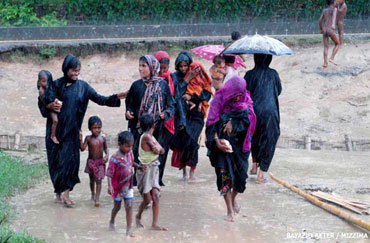More appeals for international focus on the plight of the stateless Rohingyas of Burma are being made daily. The latest is a call by five Asian human rights groups asking for “immediate steps to protect all persons from all forms of religious or ethnically motivated violence and discrimination, and promptly conduct an independent, impartial and effective investigation into the violence.”

During the past week scores of people have been killed and hundreds of homes burned in the worse sectarian violence in Burma in a decade.
The appeal was made on Wednesday by leading Asian human rights groups including The International Federation for Human Rights, the Asian Forum for Human Rights and Development, the Alternative Asean Network on Burma, the Commission for Missing Persons and Victims of Violence of Indonesia, and Jakarta Legal Aid Institute of Indonesia.
“We call on the international community, including diplomatic missions in Burma and the United Nations, to send independent monitors to visit and assess the situation and take appropriate steps to address any emerging humanitarian crisis,” the group said in a statement.
“We also call on the government of Bangladesh to re-open the border and provide necessary protection to all those fleeing from the violence in western Burma, consistent with obligations under international human rights and refugee norms,” it said. “The policy to bar entry to civilians fleeing the violence puts them at risk for more violent crimes and death.”
According to various reports, the outbreak of violence followed the rape and killing of a Buddhist woman in late May, in which the perpetrators were believed to be Muslim. On June 2 , 10 Muslim bus passengers were beaten to death by a mob seeking revenge for the crime. In the days that followed, there have been numerous and conflicting reports of further sectarian attacks perpetrated by both Buddhist and Muslim residents. One report put the number of displaced at 5,000, but actual figures may be higher and rising. The Government of Bangladesh has sealed its border to prevent those fleeing from the violence from entering the country.
On June 10, Burmese president Thein Sein declared a state of emergency in the state, the first time he has done so. The declaration authorizes the military to assume significant and sweeping administrative functions.
‘Although the current clashes were triggered by the June 2 incident, the violence is inextricably linked to the decades-long discriminatory policies of the Burmese government towards the Rohingya Muslims,” said the statement. “The systematic persecution by the authorities includes denial of citizenship under Burma’s 1982 Citizenship Act which renders Rohingya stateless and utterly without protection. In addition to public vilification by state media and state officials, Rohingya have been subjected to restrictions on marriage, domestic travel and observation of religious ceremonies. The Rohingya have also been particularly vulnerable to other serious human rights violations faced by the general population in Burma.”
The human rights community has consistently called on the government of Burma to engage in a genuine and inclusive dialogue with all political parties, other pro-democracy forces, and all ethnic nationality groups, in order to move forward in a broad-based process of national reconciliation, said the group, and reconciliation would also require the amendment or repeal of all repressive and discriminatory laws and practices that have been used to persecute people from the many different communities in Burma.
“We believe that the building of a truly democratic Burma requires commitment to address deep-seated discrimination and the laws that perpetuate them,” it said. “The commitment of the Thein Sein administration to democratic reforms will be measured by its willingness both to acknowledge that these laws and practices are obstacles to democratization and to take bold steps to lift them.”


